
Is Java Dead in 2024? The Truth About Java Popularity
Java. The language that some praise for its versatility and impressive balance of capabilities, for others it’s mostly the subject of jokes.
Throughout its 30-year history, this ever-so-popular programming language has risen to become one of the most popular programming languages out there, and even in 2024, against all odds, it still plays an important role in the modern IT market.
In today’s post, we will discuss the rise and evolution of Java and the interesting future that lies ahead for this versatile programming language. So without further ado, let’s get to it.
History of Java programming language
Did you know that Java – a widely used programming language that powers everything from major enterprise software applications to the Mars Rover – was born out of a need for a better TV remote control?
Let’s take a trip down memory lane and see how Java’s story began.
Java was first designed in 1990 by James Gosling at Sun Microsystems as part of a project called the Green Project. The goal of this project was to develop software to control home appliances and other consumer devices using digital technology. It powered one of their first inventions – the STAR7 PDA, which also gave birth to the Java mascot – Duke.
The breakthrough came with the release of Java 1.0 in 1996, accompanied by the now-familiar slogan “Write Once, Run Anywhere,” which encapsulated the language’s ability to work seamlessly across platforms. This innovation was achieved through the use of the Java Virtual Machine (JVM), a critical component that allowed Java bytecode to run on any system with a compatible JVM, regardless of the underlying hardware or operating system.
As the Internet age really started to take off, Java solidified its position by enabling the creation of dynamic and interactive Web content. Applets, Java’s first foray into Web-based applications, demonstrated its potential to enhance the user experience through client-side interactivity. The new millennium saw Java’s expansion into enterprise computing with the introduction of Java 2 Enterprise Edition (J2EE), later renamed Java Platform, Enterprise Edition (Java EE).
In 2006, Oracle Corporation’s acquisition of Sun Microsystems ensured Java’s continued growth. Despite occasional controversy and litigation over licensing and ownership, Java’s open source nature has persisted, fostering a robust ecosystem of community-contributed libraries, frameworks, and tools.
Today, despite being in its 3rd decade, it’s still one of the most popular programming languages. It remains a staple in everything from web and Android apps to server-side programming and large-scale enterprise systems.
Why Java is still one of the most popular programming languages
Java hasn’t had it easy in recent years.
Python developers make fun of Java for its notorious boilerplate code. C programmers laugh at the often ridiculous class names. And C++ developers hate it because you can’t blow your face off with manual memory management.
So is Java dead in 2024?
Not by a long shot.
Despite its issues, Java is still in the top 5 list of the most popular programming languages among Python and the C family of languages, according to the TIOBE index. There are still thousands of job postings for experienced Java programmers, and companies in industries as diverse as fintech, healthcare, and travel. All of them are still choosing Java object oriented language as the primary programming language in their custom software development tech stack.
So what’s the deal? Why does it maintain its strong position and popularity despite its flaws?

Above all, Java is an exceptionally well-balanced programming language, which is its main strength and a key reason why it is so often chosen by companies to develop enterprise software solutions.
It provides sufficient performance for most scenarios you might encounter. It’s also relatively easy to use, offers good software security, and perhaps most importantly, it provides development teams with a large and robust ecosystem of frameworks and libraries.
This is the main reason why it is such a versatile language.
Java can power large enterprise web applications with the Spring framework, big data pipelines with Kafka, mobile application development, cloud computing architectures and even things like the controller for NASA’s Mars rover.
What made Java innovative back then was that instead of compiling to machine code like C or C++, it compiled to byte code that could run on any system without recompilation. This byte code can then be executed by the Java Virtual Machine, or JVM for short, making Java a platform-independent programming language.
Java is therefore both a compiled and an interpreted language. The only thing you need is the Java Runtime Environment (JRE), which is installed on most modern computers.
For software developers, this means “write once, run anywhere” – a phrase that has been Java’s main selling point for many years.
Java is also a strongly typed, object-oriented programming language with a curly bracketed syntax similar to the C family of languages. However, Java code offers programmers more high-level features such as garbage collection, runtime type checking, and reflection.
In short, Java’s enduring popularity is due to two key things – an incredibly rich community of developers and open-source projects, and a mix of features that large enterprises value.
Hire Java developers with Stratoflow
If you want to hire Java developers seek the help of industry professionals! Stratoflow devs offers a compelling advantage for businesses looking to develop high-performance, secure, and scalable software applications. With over 10 years of expertise under our belt in Java development, our team of top-notch Java engineers from Poland, is recognized for their efficiency in handling massive data processing applications capable of processing millions of queries per second.
Embracing modernity: New features coming to Java
Java is primarily used in enterprise software development, and these large organizations are very slow to adapt to new features. There are tons of mission-critical applications still running on old versions of Java, and these organizations are very reluctant to upgrade unless they have to.
However, since Java SE 10, new versions of Java have been released every six months, and Java 21 promises to address some of the most notorious problems. Let’s take a quick look at what’s in store:
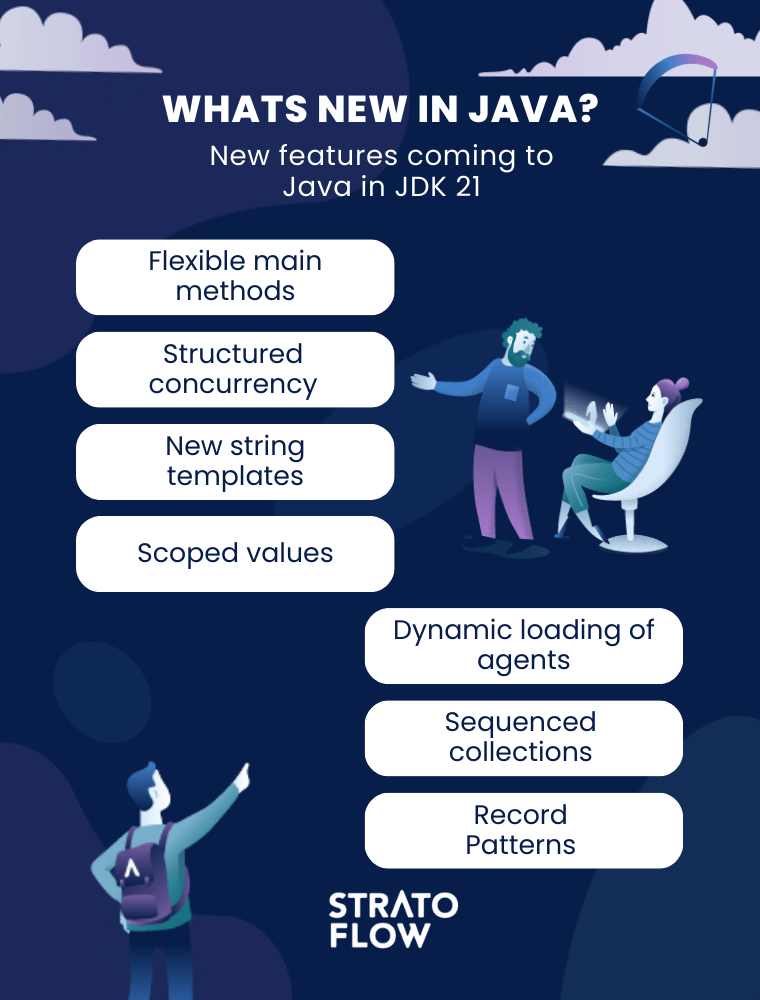
Flexible main methods
Want to write a “Hello world” in Java? You need to use ‘public static void main(String[] args)‘ class to do that.
Beginners often find the necessity of declaring and understanding this class to be somewhat challenging.
This new proposal for Java 21 introduces unnamed classes and instance main methods that allow you to create a main method without a class and ‘public static void main(String[] args)‘.
void main() {
System.out.println("Hello, World!");
}Keep in mind that this feature is primarily aimed at making learning Java easier for novice developers.
It may not be as important to senior devs, but it will certainly make it more accessible and convenient for beginners – an aspect that is really important for the sake of maintaining an active and thriving developer community.
Structured concurrency
In the latest update, some changes are also being made to improve java performance and efficiency of software in a form of structured concurrency.
The goal of JDK 21’s Structured Concurrency is to simplify concurrent programming by introducing an API designed for structured concurrency.
This strategy treats clusters of interconnected tasks running in separate threads as a single unit of work. It allows programmers to write multiple concurrent jobs on multiple threads while treating them as a single unit of work. As a result, this methodology streamlines error and cancelation management, improves reliability, and increases visibility into concurrent processes.
Response handle() throws ExecutionException, InterruptedException {
try (var scope = new StructuredTaskScope.ShutdownOnFailure()) {
Supplier<String> user = scope.fork(() -> findUser());
Supplier<Integer> order = scope.fork(() -> fetchOrder());
scope.join() // Join subtasks
.throwIfFailed(); // Propagate errors
// Both subtasks have succeeded. Compose their results
return new Response(user.get(), order.get());
}
}New string templates
Java does not support string interpolation. This means that until now you had to combine multiple strings or use string.format, which is also quite annoying.
In Java 21 there will be a new string template, which is a new type of expression that allows developers to insert values directly into strings. The goal of this brand-new feature is to make writing Java programs easier, to improve the clarity of expressions that combine text and values, and to improve the security of Java programs that construct strings from user input.
String name = "Tom";
String info = STR."My name is \{name}";
assert info.equals("My name is Tom"); // trueThese are just a few examples of the new features being introduced in the latest version of Java, and while some organizations are often stuck with versions as old as Java 7, the entire ecosystem is moving forward to introduce new features and stay competitive with other programming languages out there.
Why is Java so popular today? Senior developers’ insights
So we already know why enterprises choose Java as the core of their technology stack, but what do developers themselves think? Do they enjoy working with Java? What features do they find most annoying?
To find out, we reached out to some of our most experienced senior developers to get their honest opinions on the language they’ve spent countless hours working with.
[Read also: Guide to Java Profilers: Which Performance Monitoring Tool Is the Best?]
What makes Java great?
Great versatility
As we’ve already mentioned, Java is a bit of a jack-of-all-trades when it comes to programming languages, and that is one of the key reasons why its a widely used programming language.
It may not break any performance records, and some other languages may be better suited to tasks like AI development, but overall it is a remarkably well-balanced language.
It’s powerful enough for most projects, it’s relatively easy to use, and, most importantly, it provides a rich and robust ecosystem of libraries and frameworks that make a developer’s job so much easier.
Active developer community
Open source contributions from community members are another hallmark of the Java programming language.
A wide variety of libraries, frameworks, and tools are continuously developed and maintained by community members, providing ready-made solutions to common problems like Hazelcast, Kafka or Coherence. This encourages code reuse, reduces development time, and ensures that programmers can focus on higher-level tasks rather than reinventing the wheel.
Stability and a multitude of solutions developed by the community, much of it open source, is one of the key things I like about Java. These solutions provide a great sense of security and ensure that a situation when, for example, a component will stop working because the author of a library has stopped working on it, wont happen.
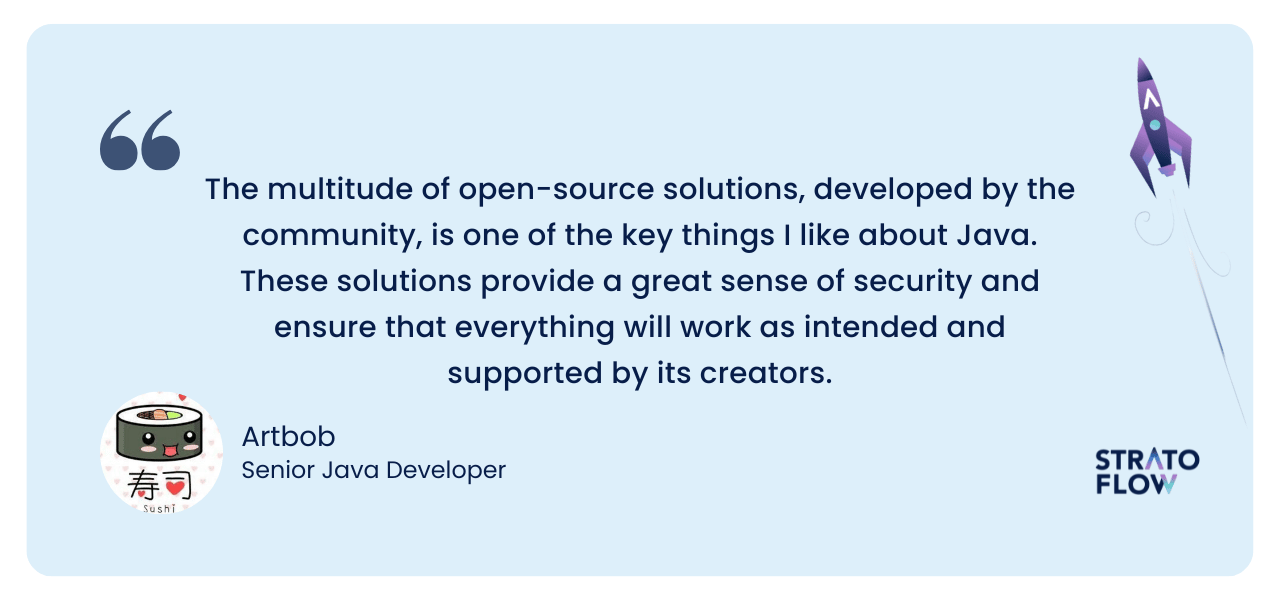
Platform independence and Just-In-Time (JIT) compiler
Platform independence and the Just-In-Time (JIT) compiler are two critical factors that help Java developers in their programming efforts.
Code written in Java can run seamlessly on multiple platforms thanks to the Java Virtual Machine (JVM), which interprets bytecode. In addition, the JIT compiler optimizes runtime performance by dynamically translating bytecode into native machine code during execution. This process significantly increases the speed of Java applications by allowing the compiled native code to run more efficiently.
The great concept of bytecode, makes it so you don’t have to worry about the architecture of the computers you are coding for, and at the same time, the performance is the same or sometimes even better than languages compiled for a given platform, thanks to JIT.
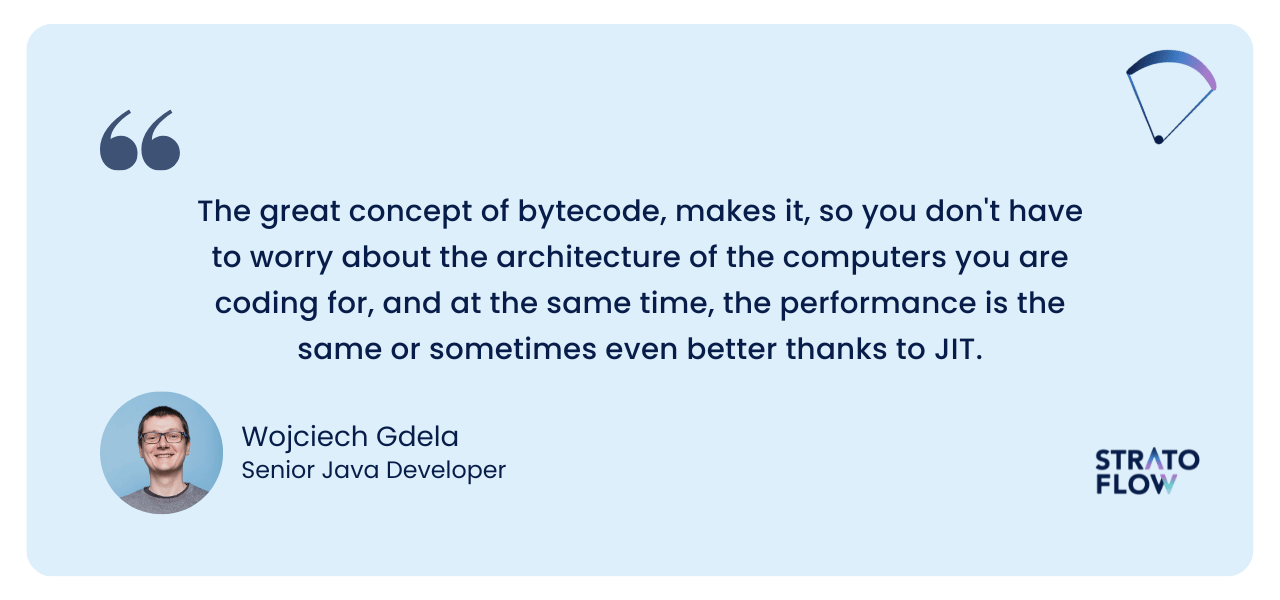
Solid foundations
Java has a very strong position in the global IT market.
Why does this matter to the average Java developer?
Java and its JVM virtual machine have been on the market for so many years that they have already overcome all the so-called “teething problems”.
By this point, there is virtually no risk of unexpected problems arising due to something no one can explain. By now almost all bugs are due to errors in our software/libraries, and not the language/environment itself.
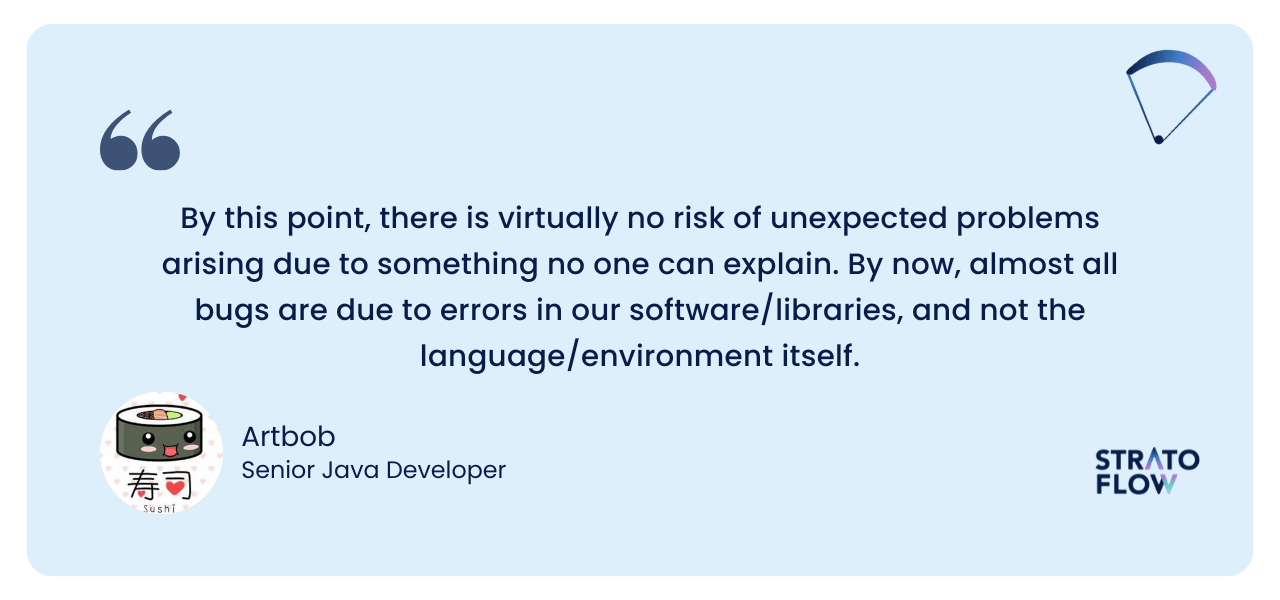
As further confirmation of this, the JVM has become the primary environment for more programming languages that run on top of it, such as Scala and Kotlin.
This is another advantage, as it allows developers to develop low-latency Java applications using more “specialized” languages that are better at certain tasks, such as Scala for functional programming, while maintaining the legacy software core created many years earlier in pure Java.
So even though Java itself may be a middle language, the JVM and the Java ecosystem are both incredible and will still offer great capabilities in 2024.
[Read also: Java Best Practices That Every Java Developer Should Know]
Encouraging developers to write cleaner code
The way the Java programming language is built encourages programmers to write high-quality, clean code. Some might say that it is pedantic in nature.
The way Java has moved away from one-letter and abbreviated names of variables, classes, methods, and parameters has improved code understandability and readability.
Java has also made it possible to hide much of the technical stuff (e.g., memory allocation, garbage collection) so that the codebase can focus on the business logic – the most important aspect of the project to get your head around, especially in enterprise business scenarios.
I like Java for making it easier and sometimes even forcing programmers to make the code they write readable and well laid out, making it easier for their colleagues to understand the entire code base.
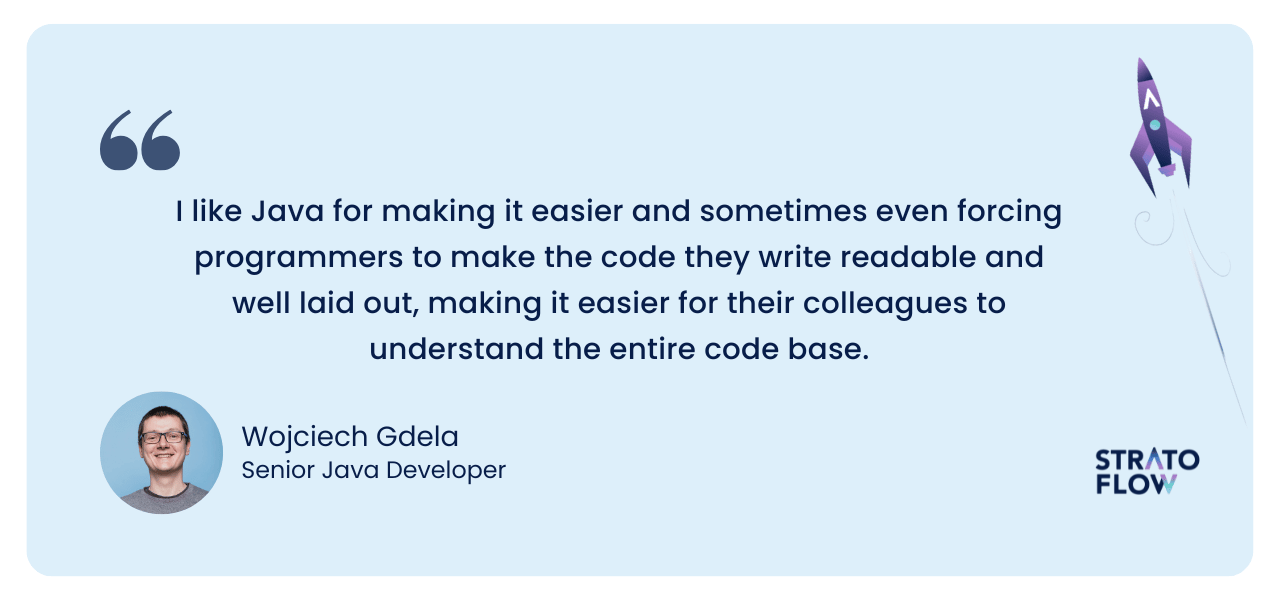
What do developers find most annoying about Java?
As you might have guessed, not everything about Java is so beloved by developers. There are some aspects of the language that are either convoluted, unnecessarily complex, or just plain annoying. Here are three things that bother our senior developers the most:
Boilerplate code
The first item on this list, not surprisingly, is boilerplate code.
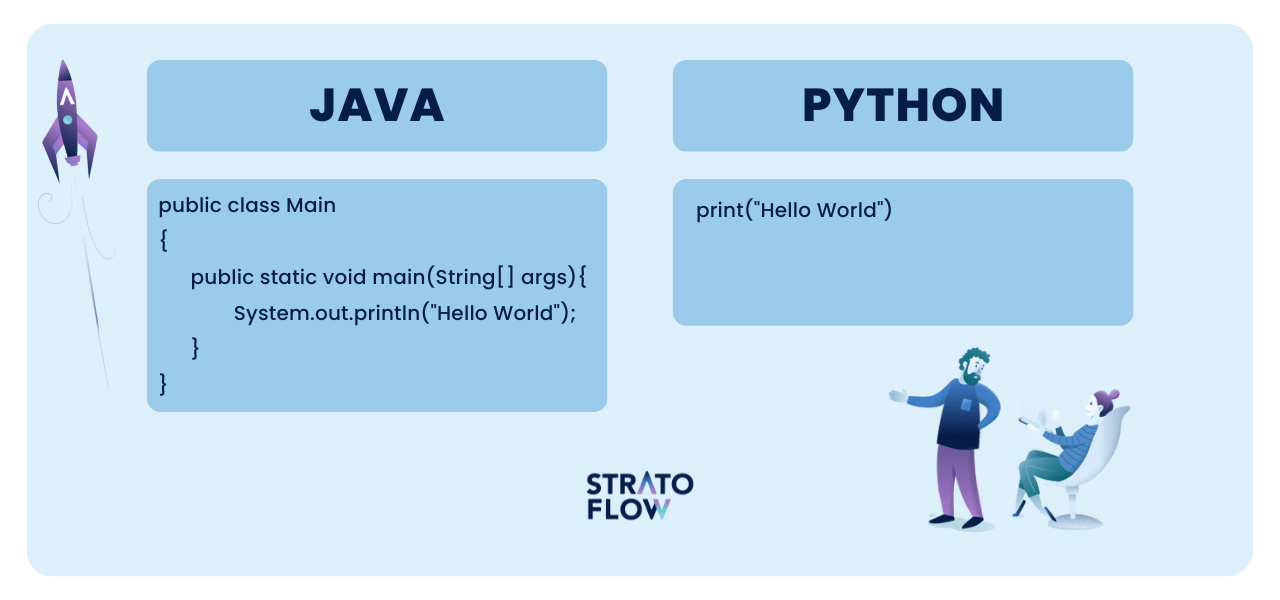
This phenomenon results from the language’s emphasis on explicitness and strong typing, which in turn can lead to an excessive amount of repetitive and verbose code. The need to declare types, handle exceptions, and manage various aspects of memory and resource management often results in code that is more concerned with administrative details than the actual business logic it is intended to express.
Despite ongoing efforts by the Java community to address this issue through frameworks, annotations, and language extensions, the challenge of boilerplate code remains a defining aspect of Java development.
In a lot of situations, simple things require writing a lot of code. There are also long class names which often make things hard to read and understand. That’s the two main things I dislike about Java.
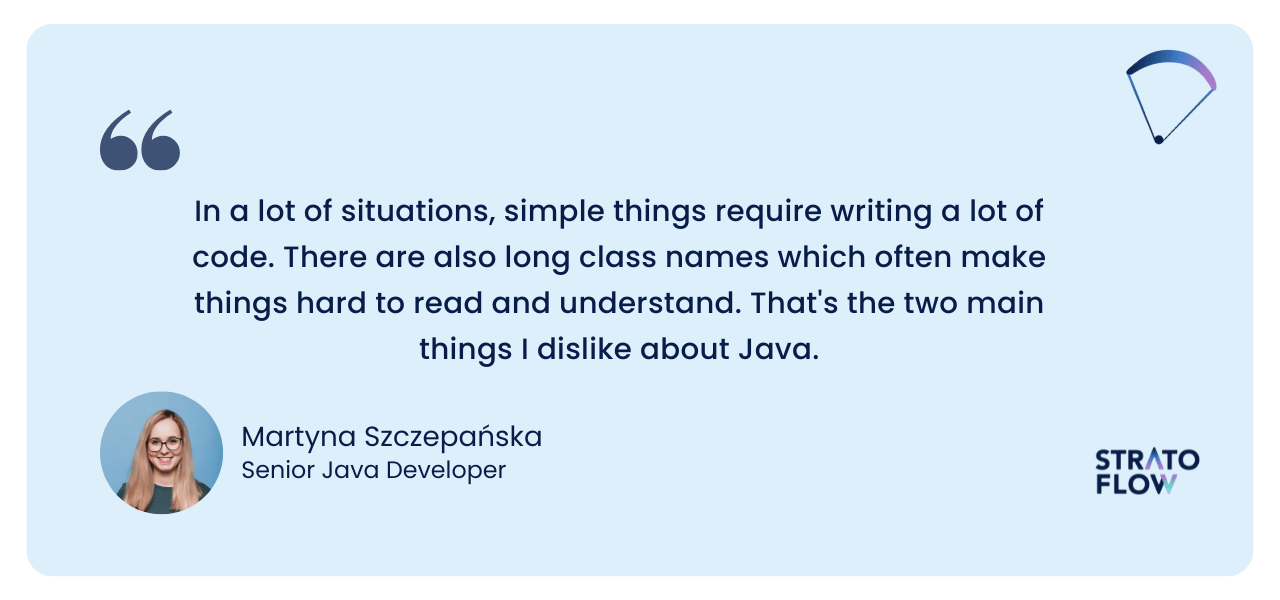
Dependency hell
Another senior developer mentioned how dependencies can lead to a very convoluted codebase, a problem that all JavaScript developers know all too well.
The abstraction introduced by dependencies can obscure the inner workings of certain functions, causing confusion when trying to understand their behavior. Transitive dependencies, version conflicts, complex configuration requirements, and the potential for tight coupling between components can exacerbate the challenge. As dependencies evolve externally, they can alter the behavior of the codebase, causing unexpected changes that can be difficult to track.
For example, if one library is urgently updated due to a security vulnerability found in it, the entire project may need to be updated due to the interactions between the libraries.
I would say that it’s the so-called dependency hell is one of the most annoying aspects of Java. In more complex projects, there can be so many dependencies on external libraries that they sometimes affect each other, which can lead to unexpected and undesirable outcomes that devs might not even be aware of.
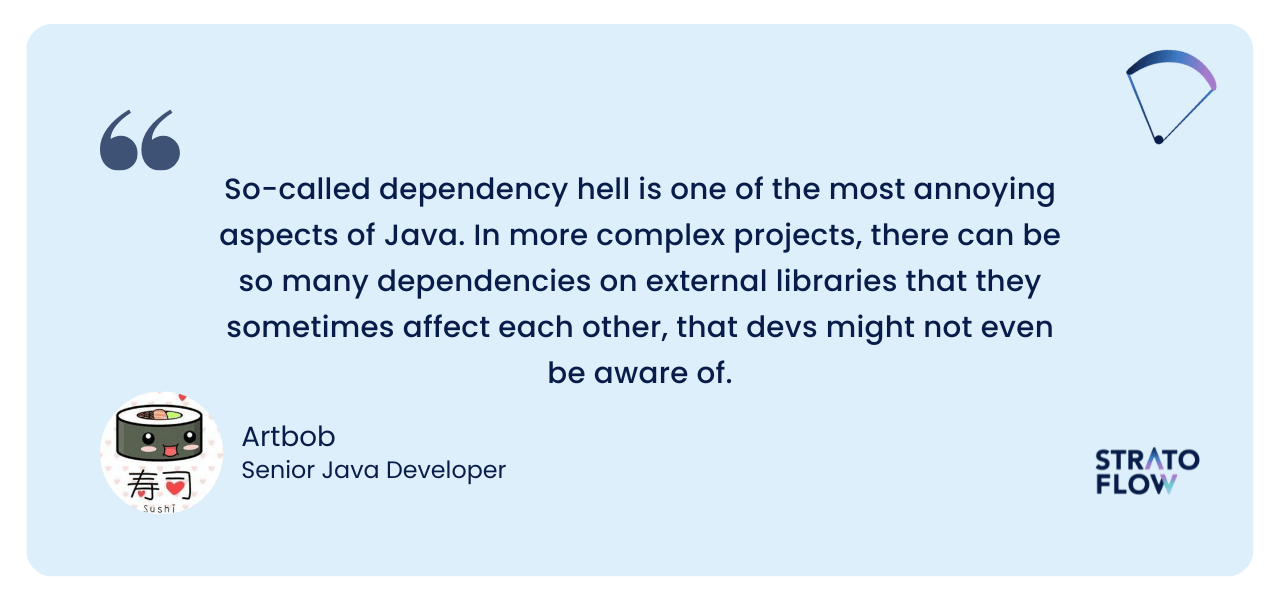
Complicated generics
Another aspect of Java that can confuse even the most seasoned Java professional is working with the more complex Java generics.
Java generics are a programming feature that allows you to create classes, interfaces, and methods that operate on types (such as data structures or collections) in a flexible and type-safe manner. The main purpose of Java generics is to allow you to write code that can work with different data types while maintaining strong type checking at compile time.
While they can greatly improve the efficiency of your code, some more advanced generics are increasingly difficult to understand.
The introduction of wildcards, such as “? extends” and “? super”, adds another layer of complexity that requires a deep understanding of type relationships.
Simple generics are alright, but some of the corner cases are really quite hard to grasp. It’s hard to figure out things like how there’s a generic in a generic and how it’s passed to a generic method that would also like to allow subclasses of that generic.

Java’s ongoing popularity – statistics
In 2023, Java is utilized by 30.55% of developers globally, maintaining its status as one of the top programming languages even after three decades.
The PYPL Popularity of Programming Language Index reveals that Java ranked as the world’s second most favored language in 2024. Oracle reports that Java enjoys widespread popularity, with over 69% of full-time developers globally using it and 51 billion active Java Virtual Machines (JVMs) deployed worldwide.
While Java’s market share was over 31% in 2008 and has decreased to 15.81% in 2023, it remains a critical component of numerous enterprise software solutions across the globe.
The reason for its enduring relevance?
As’ve already established, Java offers an excellent combination of performance, user-friendliness, and scalability, essential qualities that modern enterprises require to flourish.
Will Java remain to be popular?
How many times in recent years have we heard about the decline of Java and how it will soon be replaced by other, more powerful programming languages? Articles that told us that Java would soon share the fate of COBOL and fade into obscurity.
As we look to the future, we see that Java’s enduring popularity isn’t simply a matter of legacy systems still running old versions of Java, but rather a testament to its adaptability and remarkable balance of core functionality.
I first heard questions about Java’s demise even before 2010, when Clojure appeared. Since then, every now and then a new language comes along that is supposed to “completely transform the IT market,” and yet these promises never materialize.
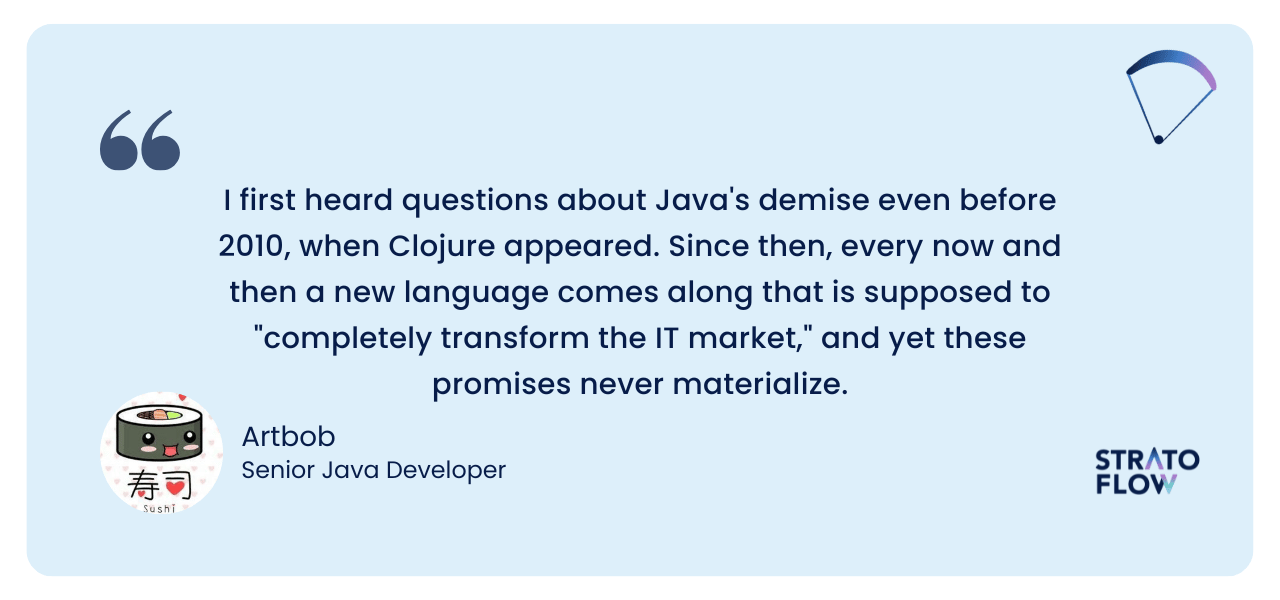
Like it or not, Java will be with us in one form or another for a long time to come.
It’s possible that it will be supplanted by some further evolution of the core language created to do more specialized tasks (functional programming, complex mathematical computations, or other areas), but as a core, it will remain.
Just as C/C++ is still very popular, especially for microcontroller programming, it all boils down to Assembler, a language that isn’t really used in any real way, but is still with us, just in a slightly different form.
Finally, the best way to sum up all the rumors about Java’s imminent demise is to quote Mark Twain:
The report of my death was an exaggeration.
Conclusion
In a landscape of constantly evolving technologies, Java’s place as one of the most popular programming language in 2024 is a testament to its enduring strengths and adaptable nature.
While some may predict its imminent demise, Java’s robust ecosystem and unique blend of high performance and ease of use solidify its position as one of the most popular programming languages for years to come and we can be pretty sure that it won’t fade anytime soon.
Related Posts
Thank you for taking the time to read our blog post!
